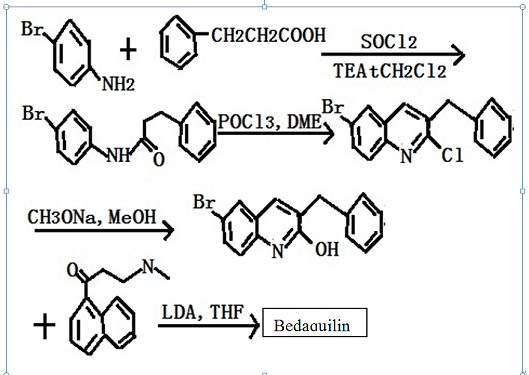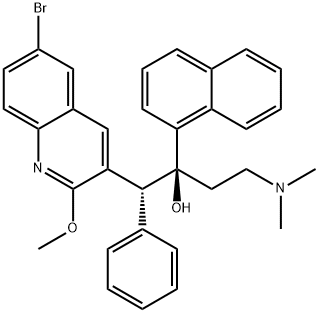ChemicalBook > CAS DataBase List > TMC-207
TMC-207
Overview Synthetic Methods Pharmacological Function Pharmacology Pharmacokinetics Adverse Effect Taboo
TMC-207
- CAS No.843663-66-1
- Chemical Name:TMC-207
- CBNumber:CB12473722
- Molecular Formula:C32H31BrN2O2
- Formula Weight:555.5
- MOL File:843663-66-1.mol
TMC-207 Property
- Melting point 104 °C
- Boiling point 702.7±60.0 °C(Predicted)
- Density 1.322±0.06 g/cm3(Predicted)
- storage temp. Room temperature
- solubility Soluble in DMSO (10 mg/ml)
- form solid
- pka 13.05±0.29(Predicted)
- color White
- optical activity [α]/D 195.0 to 155.0° (c = 0.5g/100mL in DMF)
- Stability Stable for 1 year from date of purchase as supplied. Solutions in DMSO may be stored at -20°C for up to 1 month.
- CAS DataBase Reference 843663-66-1
- FDA UNII 78846I289Y
- ATC code J04AK05
- UNSPSC Code 12352200
Safety
- HS Code :2933499090
- Hazardous Substances Data :843663-66-1(Hazardous Substances Data)
-
NFPA 704:
0 2 0
-
Symbol(GHS)



- Signal wordDanger
- Hazard statements H400-H373-H301-H410
- Precautionary statements P273-P391-P501-P264-P270-P301+P310-P321-P330-P405-P501-P273-P391-P501-P260-P314-P501
TMC-207 Chemical Properties,Usage,Production
-
Overview
Bedaquiline, formally called (1R, 2S)-1-(6-Bromo-2-methoxy-3-quinolinyl)-4-(dimethylamino)-2-(1-naphthyl)-1-phenyl-2-butanol in chemistry and known as Sirturo in commercial, is a new anti-mycobacterial medicine of diarylquinolines. It impinges on the
ATP synthesis of Mycobacterium tuberculosis by inhibiting the activity of proton pump on the cell’s ATP synthetase, and thereby eliminates M. tuberculosis (TB). It’s used for adult multi-drug resistant tuberculosis (MDR-PTB). -
Synthetic Methods

Fig: Synthetic route of Bedaquiline - Pharmacological Function Bedaquinoline has the same bactericidal activity against both sensitive and resistant strains of mycobacterium tuberculosis as well as on dormant bacteria.
-
Pharmacology
The proton pump on the cell’s ATP synthetase, which is a crucial enzyme for M. tuberculosis (TB) to synthesize ATP, is the unique and specific locus of Bedaquinoline.
After the combination onto the oligomer and lipoprotein subunit c, Bedaquinoline can inhibit the synthesis of ATP and bring the death to the bacterium cell. Compared with those existing anti-TB medicines, it presents a novel pharmacology and no cross resistance effect was found between Bedaquinoline and other anti-TB medicines. The gene sequence of the subunit c of ATP synthetase is named as atpE, whose amino acid sequence is highly conservative. The resistance of TB to Bedaquinoline comes from its reduced combination onto subunit c of ATP synthetase due to the mutation of the 63rd or 66th on atpE. - Pharmacokinetics Bedaquinoline is easy for oral assimilation. The bioavailability of Bedaquinoline taken with food is twice higher than when taken with an empty stomach. It reaches its blood concentration in 5 hours after taken and has a plasma protein binding rate of 99.9% as well as a plasma half-life of 173 hours. Bedaquinoline can be widely distributed in human body with a homeostasis distribution volume of 1000L. Its clearance rate is low enough and the elimination half-life is 5.5 months. Bedaquinoline is metabolize into metabolite 1~8 in the demethylation mainly through CYP3A4 and partly though CYP2C8 and CYP2C19. Metabolite 2 (M2), the most important metabolite, which has only 1/3-1/6 the activity of Bedaquinoline, yet present a more strong cytotoxicity and is more likely to cause the drug-induced phospholipidosis. Bedaquinoline and its metabolites are mostly excreted by feces, only 1% to 4% by urine.
-
Adverse Effect
Common adverse reactions are nausea, headache, arthralgia, loss of appetite, vomiting and rash, dizziness, elevated transaminase, increased hemodiastase, muscle pain, diarrhea and prolonged TQ interval.
-
Taboo
1.The allergic to this product;
2.Patients suffer serious dysfunction of heart, liver, kidney (relative contraindication);
3.Pregnant women, lactating women, children, the old and co-infected HIV sufferers (relative contraindication). - Description In December 2012, the US FDA approved bedaquiline as part of combination therapy for the treatment of multi-drug resistant tuberculosis (MDRTB). Bedaquiline is the first drug approved for MDR-TB and is the first approval from a new class of antituberculosis agents in the past 40 years. Due to the high unmetmedical need for treating MDR-TB, the FDA granted bedaquiline accelerated approval based on Phase II results, providing patients access to the drug while additional clinical studies are carried out. Bedaquiline (also known as TMC207 and R207910) is a diarylquinoline that was discovered from a high-throughput, whole-cell screening strategy with Mycobacterium smegmatis used as a surrogate for M. tuberculosis. Bedaquiline is a single enantiomer of an initial screening hit. Bedaquiline has potent and selective activity against mycobacteria, and is active against both drug-sensitive and drug-resistant M. tuberculosis. The mechanism of action of bedaquiline is unique amongst anti-TB drugs and involves inhibition of mycobacterial ATP synthase; it is not active against human ATP synthase. Bedaquiline has in vivo activity in numerous preclinical models of TB infection, alone and in combination with other anti-TB agents, and has bactericidal activity in established TB infection models. Bedaquiline is synthesized in five steps from 3-phenylpropionic acid and para-bromoaniline. Following amide formation, treatment with POCl3 and DMF under Vilsmeier–Hack conditions gave a 2-chloroquinoline product. Treatment with sodium methoxide, followed by condensation with 3-(dimethylamino)-1-(naphthalen-1-yl)propan-1-one, and separation of isomers gave bedaquiline.
- Description TMC207 is a diarylquinoline that selectively inhibits the proton pump of the mycobacterial ATP synthase. It demonstrates potent activity against both drug-sensitive and drug-resistant M. tuberculosis and other mycobacterial species with MIC50 values of ~0.03 μg/ml.
- Originator Janssen (Belgium)
- Uses Labeled Bedaquiline, intended for use as an internal standard for the quantification of Bedaquiline by GC- or LC-mass spectrometry.
- Uses (αS,βR)-Bedaquiline is a diarylquinoline derivative that acts as a mycobacterial inhibitor. Bedaquiline shows promise as potential drug in the treatment of tuberculosis.
- Definition ChEBI: Bedaquiline is a quinoline-based antimycobacterial drug used (as its fumarate salt) for the treatment of pulmonary multi-drug resistant tuberculosis by inhibition of ATP synthase, an enzyme essential for the replication of the mycobacteria. It has a role as an antitubercular agent and an ATP synthase inhibitor. It is a member of quinolines, a member of naphthalenes, an organobromine compound, an aromatic ether, a tertiary alcohol and a tertiary amino compound. It is a conjugate base of a bedaquiline(2+).
- brand name Sirturo
- References Andries et al. (2005), A diarylquinoline drug active on the ATP synthase of Mycobacterium tuberculosis; Science, 307 223 Koul et al. (2007), Diarylquinolines target subunit c of mycobacterial ATP synthase; Nat. Chem. Biol., 3 323 Biukovic et al. (2013), Variations of subunit {varepsilon} of the Mycobacterium tuberculosis F1F0 ATP synthase and a novel model for mechanism of action of the tuberculosis drug TMC207; Antimicrob. Agents Chemother., 57 168 Sarathy et al. (2019), Re-Understanding the Mechanisms of Action of the Anti-Mycobacterial Drug Bedaquiline; Antibiotics (Basel), 8 261 Ghahremanpour et al. (2020), Identification of 14 Known Drugs as Inhibitors of the Main Protease of SARS-CoV-2; ACS Med. Chem. Lett., 11 2526
TMC-207 Preparation Products And Raw materials
Raw materials
Preparation Products
Global(243)Suppliers
-
Supplier:
shandong perfect biotechnology co.ltd
- Tel:+86-53169958659<br/>+86-13153181156
- Email:sales@sdperfect.com
- Country:China
- ProdList:294
- Advantage:58
-
Supplier:
Henan Fengda Chemical Co., Ltd
- Tel:+86-371-86557731<br/>+86-13613820652
- Email:info@fdachem.com
- Country:China
- ProdList:20235
- Advantage:58
-
Supplier:
BEIJING SJAR TECHNOLOGY DEVELOPMENT CO., LTD.
- Tel:+86-18600796368<br/>+86-18600796368
- Email:sales@sjar-tech.com
- Country:China
- ProdList:485
- Advantage:58
-
Supplier:
Henan Tianfu Chemical Co.,Ltd.
- Tel:+86-0371-55170693<br/>+86-19937530512
- Email:info@tianfuchem.com
- Country:China
- ProdList:21628
- Advantage:55
-
Supplier:
ATK CHEMICAL COMPANY LIMITED
- Tel:+undefined-21-51877795
- Email:ivan@atkchemical.com
- Country:China
- ProdList:33024
- Advantage:60
-
Supplier:
Lianyungang happen teng technology co., LTD
- Tel:15950718863
- Email:wang666xt@163.com
- Country:CHINA
- ProdList:295
- Advantage:58
-
Supplier:
career henan chemical co
- Tel:+86-0371-86658258<br/>+8613203830695
- Email:sales@coreychem.com
- Country:China
- ProdList:29858
- Advantage:58
-
Supplier:
Biochempartner
- Tel:0086-13720134139
- Email:candy@biochempartner.com
- Country:CHINA
- ProdList:965
- Advantage:58
-
Supplier:
Jinan Carbotang Biotech Co.,Ltd.
- Tel: +8615866703830
- Email:figo.gao@foxmail.com
- Country:China
- ProdList:8497
- Advantage:58
-
Supplier:
BOC Sciences
- Tel:+1-631-485-4226
- Email:inquiry@bocsci.com
- Country:United States
- ProdList:19552
- Advantage:58
843663-66-1, TMC-207Related Search:
- Sofosbuvir Bedaquiline fumarate VIGABATRIN Lenalidomide Tapinarof Tenofovir DRONEDARONE HYDROCHLORIDE TRIFLUOROACETALDEHYDE METHYL HEMIACETAL Artemisinin XL-647 N-(4-piperidinyl)-4-(2,6-dichlorobenzoylamino)-1H-pyrazole-3-carboxamide Hcl BMS 777607 TM2-115 Entacapone Quinolinic acid Unii-4bmh7izt98 Fatostatin A Fatostatin A
- API
- Inhibitors
- 化学试剂
- 杂质对照品
- 抑制剂
- 化工试剂
- WHO基本药物配体
- 原料药
- API原料药
- 医药体
- 医用中间体
- 试剂
- 医用原料
- 医药化工类
- 小分子抑制剂
- 医药原料
- 化学原药
- 医药中间体
- 小分子抑制剂,天然产物
- C31H29BrN2O
- C32H31BrN2O2
- 贝达喹啉,10 MM DMSO 溶液
- (ΑS,ΒR)-贝达喹啉
- 贝大喹啉
- (1R,2S)-1-(6-溴-2-甲氧基喹啉-3-基)-4-(二甲基氨基)-2-(萘-1-基)-1-苯基丁-2-醇
- 贝达奎林
- TMC-207(非正确对映体)
- 贝达喹啉 D6
- 乐伐替尼中间体2
- 6-溴-ALPHA-[2-(二甲基氨基)乙基]-2-甲氧基-ALPHA-1-萘基-BETA-苯基-3-喹啉乙醇 贝达喹啉 1G
- 贝达喹林
- 贝达喹啉BEDAQUILINE
- (1R,2S)-1-(6-溴-2-甲氧基喹唑-3-基)-4-(二甲基氨基)-2-(萘-1-基)-1-苯基丁-2-醇
- 6-溴-ALPHA-[2-(二甲基氨基)乙基]-2-甲氧基-ALPHA-1-萘基-BETA-苯基-3-喹啉乙醇 贝达喹啉
- 贝达喹啉
- 6-溴-ALPHA-[2-(二甲基氨基)乙基]-2-甲氧基-ALPHA-1-萘基-BETA-苯基-3-喹啉乙醇
- 843663-66-1
- Bedaquiline, 10 mM in DMSO
- Bedaquinoline
- Bedaguiline
- (alphaS,betaR)-Bedaquiline
- Bedaquline Fumarate
- 3-Quinolineethanol, 6-bromo-α-[2-(dimethylamino)ethyl]-2-methoxy-α-1-naphthalenyl-β-phenyl-, (αS,βR)-
- 3-Quinolineethanol, 6-bromo-alpha-(2-(dimethylamino)ethyl)-2-methoxy-alpha-1-naphthalenyl-beta-phenyl-, (alphas,betar)-
- 1-(6-Bromo-2-methoxy-quinolin-3-yl)-4-dimethylamino-2-naphthalen-1-yl-1-phenyl-butan-2-ol
- 6-Bromo-alpha-[2-(dimethylamino)ethyl]-2-methoxy-alpha-1-naphthalenyl-beta-phenyl-3-quinolineethanol
- Sirturo
- Bedaquiline
- BedaquilineQ: What is Bedaquiline Q: What is the CAS Number of Bedaquiline Q: What is the storage condition of Bedaquiline Q: What are the applications of Bedaquiline
- Bedaquiline D6Q: What is Bedaquiline D6 Q: What is the CAS Number of Bedaquiline D6 Q: What is the storage condition of Bedaquiline D6 Q: What are the applications of Bedaquiline D6
- (1R)-(6-Bromo-2-methoxyquinolin-3-yl)-4-(dimethylamino)-2(S)...
- BEDAQUILINE (TMC207, R207910)
- TMC-207 USP/EP/BP
- BEDAQUILINE;TMC207;R207910;TMC 207;R 207910;TMC-207;R-207910
- CS-751
- TMC-207(Bedaquiline)
- 141027
- (αS,βR)-6-Bromo-α-[2-(dimethylamino)ethyl]-2-methoxy-α-1-naphthalenyl-β-phenyl-3-quinolineethanol
